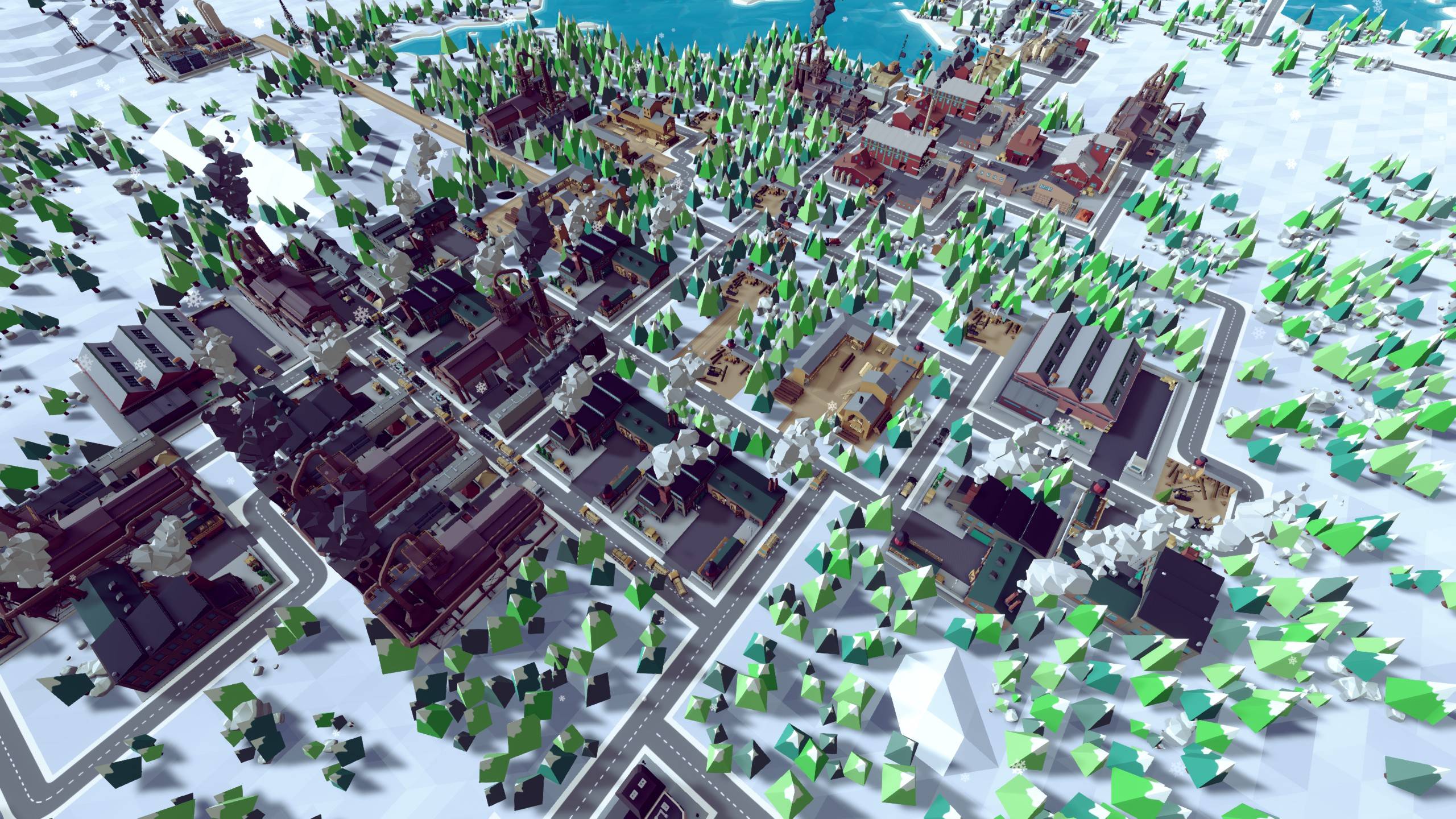Search
[{{{type}}}] {{{reason}}}
{{/data.error.root_cause}}{{{_source.title}}} {{#_source.showPrice}} {{{_source.displayPrice}}} {{/_source.showPrice}}
{{#_source.showLink}} {{/_source.showLink}} {{#_source.showDate}}{{{_source.displayDate}}}
{{/_source.showDate}}{{{_source.description}}}
{{#_source.additionalInfo}}{{#_source.additionalFields}} {{#title}} {{{label}}}: {{{title}}} {{/title}} {{/_source.additionalFields}}
{{/_source.additionalInfo}}Rise of Industry (PC) (Preview)

Rise of Industry
Developed By: Dapper Penguin Studios
Published By: Kasedo Games
Released: February 9, 2018
Available On: Windows, Linux
Genre: Simulation, Strategy, Economy, Management
ESRB Rating: N/A
Number of Players: 1
Price: $24.99
(Humble Store Link)
Thank you Kasedo Games for sending us a preview code!
Rise of Industry is a tycoon game about consumption and production. As a tycoon game, "RoI" simply gives you one objective: make as much money as possible. RoI's main way of making money is by a series of industrial factories that can be used to make different products. But before we get to the big stuff let's start from the bottom.
When you first go to create a world you'll find you can choose many things to edit. You can choose how big the world is, how many towns there are, if resources are infinite or limited, how big of a loan you want to take to start off with and even what side of the road your trucks should drive on! Each has their own drawback or benefit. If you choose a smaller world you won't get as much room to build your factories, but you won't have to take your products far to a city. If you choose large you'll have plenty of room to build but will be further away from each city. Speaking of towns, each map size has their own amount of towns, with larger ones having more.
Resources can be changed to be limited, but I wouldn't recommend this for beginners as it might be difficult for you to deal with. When it comes to the loan size, it really matters depending on how you like to play games like this. Do you like building massive and intricate production chains, or just some small factory lines that you build upon? The bigger the loan, the more money you have to pay back. But you don't have to start paying the loan immediately, as the game gives you plenty of time to build some money up before it starts taking some back. For the trucks, as I'm an American, I have to go with right.
Before you start building your reputation in RoI's square world, you have to find a city to build your headquarters in. RoI has multiple towns in its world, each with their own products that they will buy and sometimes even stores that other places won't have. You have to look at all the towns, see what kind of products they'll buy, and if any other towns will pay more for them. Typically towns start with a hardware store and a farmer's market. The hardware store usually accepts things like ores, natural resources and beginner products while the farmer's market allows you to sell fresh produce like milk, eggs, vegetables and more. Once you've decided on a city that will let you get as much money for your product as possible you simply place your headquarters near the town.

Strong Points: Interesting gameplay mechanics; Good art style; Good soundtrack
Weak Points: Gameplay can get boring; Somewhat large learning curve
Moral Warnings: None
Before you can start production you have to get supplies. There are a variety of supplies to farm such as sand, water, wood, copper, iron, coal and more. Each resource is used in the production of something, whether it be fuel, metal, glass, wheat, livestock and so much more. Each resource is placed randomly throughout the world in little pockets, with the only exceptions being wood, water and sand which are readily available. What this means is that you can't just place a copper mine in the middle of nowhere and expect to get copper. Instead, you have to find a copper pocket, which is basically just a bunch of copper rocks placed in a small area somewhere in the map. Because these resources are hard to find and often not close to each other, you have to plan what you want to make based on what you have near you. If you were planning to build something that needed coal and iron but only had copper near you, you'd have to think of something else to build. Before you can even start building you have to plan ahead according to what's near you.
Before you can make any products, you have to research them. Researching a product takes time, sometimes a lot of it, but it also takes money. There are three tiers in research, with each tier taking more money and time to research. You can't just research a higher tier product, however, as the first tier has to be researched beforehand. For example, say you wanted to make pizza. Before you could make it, you would need to know how to make dough and cheese. And before that you'd need to know how to make wheat to make cows to produce the milk for the cheese and dough. It can get complicated and expensive quickly. But to not make the game too difficult at the start you're given three items you can research for free. You can choose what you want to research, the only exception being you can't research tier three products and as explained above you can't research a tier two product without researching the ones before it.
In RoI, things don't just magically move from place to place. In order to make things move, you need transportation. Transportation is used to connect gatherers to factories, factories to towns, and so much more. RoI has several options for transportation, such as trucks, trains and even blimps. Each option is more expensive to set up and run. As such, in the beginning, you'll mostly be using roads. There are two kinds of roads you can build; dirt and urban. Dirt roads are slower than urban roads, but cheaper. In addition, dirt roads are available to be built from the start of your game, while urban roads need to be researched. You can also create bridges over rivers, or tunnel through mountains.
Time for production. Before you can start, however, you have to place your gatherers to get resources for your factories or farms. The most basic gatherers you can get are a water siphon and a lumberyard, as most starting products need water or wood. Most gatherers aren't all in one unit, but up to four separate units. There are three generators that you place on tiles specific to the gatherer, such as wood, oil, water, sand and more. Then there's one main building that the generators send all their resources to. From that building, you send your resources out to your farms or factories as is needed. On some you need to connect the generators to the building with roads or else they won't produce anything.

Higher is better
(10/10 is perfect)
Game Score - 68%
Gameplay - 13/20
Graphics - 6/10
Sound - 7/10
Stability - 4/5
Controls - 4/5
Morality Score - 100%
Violence - 10/10
Language - 10/10
Sexual Content - 10/10
Occult/Supernatural - 10/10
Cultural/Moral/Ethical - 10/10
Most factories are not available to you at the beginning and are locked behind research. In order to build them, you have to research products that can be made in them. Once you've researched something that can be made at these numerous factories, you're good to start building. Every month, you pay a sum of money based on how many buildings you have running and how fast you're running them. Once you've started supplying your factories with resources, they'll start producing their product, whether it be glass, steel, crops or much more. Some products take longer than others, and as such require a longer time to return money. Usually the more complicated the item is, the more money you can earn from it. As you make more money, you invest more back by building more factories, trying to make things faster or trying to make different products. Rise of Industry, as you can tell, is a very complex game. The factory mechanic is a lot deeper and more complex than I can do it justice.
As your production grows and you sell more and more products, the town you're selling them to will grow. And as it grows, there's a chance it will have an opportunity to upgrade itself. All towns usually start off as villages, and as they upgrade to cities and later metropolises they open more shops, allowing you to make different products. You have an option to supply the towns with certain supplies like bricks that allow them to upgrade faster, however they'll eventually upgrade by themselves if given enough time. It's better to upgrade them as fast as you can though, to get more opportunities to sell better products. RoI also has many random events that can influence gameplay. Workers can be hurt and sue you, costing you a decent chuck of money monthly in fines. There can be a blizzard that slows transportation by 25%. Mines can collapse and make mining more expensive and slower. However, there can also be good events, such as towns offering you tax breaks that lower operating costs. I've spent a lot of time discussing the gameplay, so let's talk about some other things.
Rise of Industry has a low-poly 3D graphic style, which compliments its gameplay. It manages to be colorful and detailed despite its low-poly look, and looks good at higher resolutions. It also has a free look mode, which allows you to take your camera anywhere in the world to look at models up close. RoI's music has been designed to allow you to focus while still providing a nice backdrop to the world. These simple but great melodies with piano and strings provide the perfect atmosphere that this game should have.
I will say that I do like this game, and find it enjoyable to play, with a great mechanic at its core. The problem, however, is the learning curve for this game. At around 25 hours played, I have an alright understanding of RoI but still have a lot to learn. It can also take a while to really start making money back, depending on how big you start off. I tried to start making very complicated products from the beginning, so it took me several hours to start really making money back for the investments I put in. Due to this long process of investment and return, it can also get somewhat boring. RoI is also in early access, meaning it's not completed and that the developers have more content they plan to add. While I am all for brand new content that expands the game, what I don't like is the fact that after every update any save you had is destroyed. The only thing you can do at that point is download an older version of the game or start a new save.
I believe Rise of Industry is a well made industrial tycoon game, although it can be slow and hard to learn from the start.
- Remington








